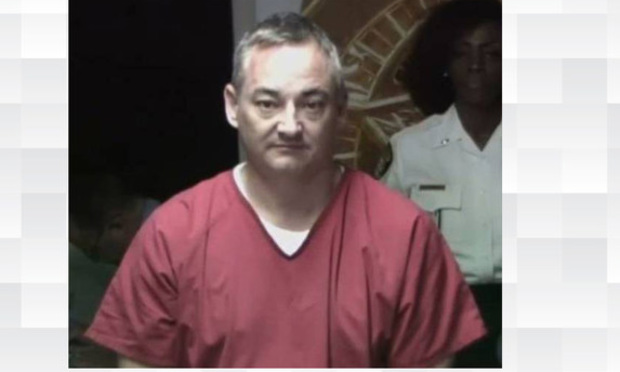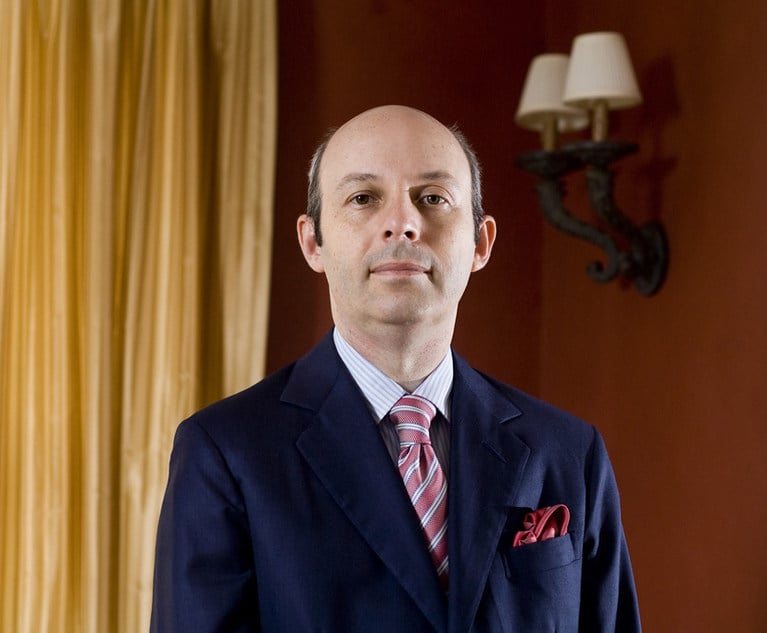The Last Days of Judge Timothy Maher: What Led a Federal Jurist to End His Own Life?
A look at the incidents leading to the suicide of a federal administrative law judge in Miami-Dade, who took hostages and had a prolonged standoff with police.
August 28, 2018 at 04:16 PM
7 minute read
 Miami-Dade County Administrative Law Judge Timothy Maher. Photo: Miami-Dade Courts
Miami-Dade County Administrative Law Judge Timothy Maher. Photo: Miami-Dade Courts
“Everybody has bad days,” a hostage negotiator said to 51-year-old Administrative Law Judge Timothy Maher in the early hours of Aug. 24.
The men were in the midst of a 10-hour ordeal that had begun around 11 o'clock the night before.
That night, Miami-Dade Police had received a flurry of text messages from hostages asking for help from inside the house at 23965 SW 113th Passage, a quiet suburban street.
Watch the video of neighbors' interviews and the judge's standoff with police:
Soon, officers surrounded the South Miami-Dade County home and out came the megaphones and police tape. They assembled hostage negotiators and a special response team, who tried to spark dialogue with those inside the home, but initially heard nothing back.
The hostage taker? A federal judge, Maher, armed with a gun.
 Related: Federal Judge Kills Himself in Standoff With Police
Related: Federal Judge Kills Himself in Standoff With Police
And inside the house, his alleged victims: a child, 13-year-old Sara, and her 49-year-old parents Jose and Ana Rodriguez, who police say are Maher's former in-laws.
The judge would eventually end his own life.
But in the days that followed, a stunned community asked: What led him there?
'Flicker of light'
Maher was admitted to the bar in 2006. By day, he presided over Social Security disability claims in downtown Miami.
According to the website of Florida's Office of Disability Adjudication and Review, last updated in March, Maher had approved 46 percent of the 1,994 cases he'd disposed since 2010.
Users in the public comments section of ODAR's website described the judge as “compassionate,” “impartial” and “fair.”
But on that night, as SWAT teams evacuated the neighborhood, hostage negotiators addressed Maher through a megaphone.
“If you can hear me, do me a favor and flicker a light so I know you can hear me and you're okay,” a negotiator called out.
Nothing.
“Just give me a flicker of light so that I know that you and everybody in there is OK,” the negotiator repeated a few moments later. ”Everything else we can talk about. Simple request. That's all I ask.”
After receiving no response from Maher, the negotiator appealed to the other people in the house — Jose, Ann or Sara — to turn on a light anywhere inside to demonstrate that they were safe.
“There is no reason to escalate this any further,” the officer said.
Maher eventually turned a light on and engaged in communcation with police for several hours.
But the house again went quiet until around 9 a.m. when a lone gunshot was heard, according to the Miami-Dade Police Department.
Officers then entered the home to find Ann, Jose and Sara unharmed.
But the judge was fatally wounded by an ”apparent” self-inflicted gunshot.
Watch the Miami-Dade Police briefing:
WATCH LIVE – Miami-Dade Police Briefing On SWAT Standoff With Miami-Dade Judge https://t.co/Lz6AaKuJHa
— CBS4 Miami (@CBSMiami) August 24, 2018
'Horrifically Embarrassing'
On Aug. 14, the week before the standoff, Maher found himself on the wrong side of the bench when he was accused of sparking a domestic dispute. He was charged with aggravated assault with a firearm, child abuse without great bodily harm and resisting an officer without violence. According to the police report, Maher allegedly pointed a rifle at his ex-girlfriend in her El Portal home when he came to pick up their 4-year-old son under a shared-custody arrangement. The couple reportedly broke up in April after almost four years together.
In his Aug. 15 bond court hearing, Maher appeared before Miami-Dade Circuit Judge Renatha S. Francis and denied the charges against him. He also claimed his estranged girlfriend had a history of making false accusations against him, according to news reports.
“This is horrifically embarrassing to me. It is career-threatening,” said Maher, as he raised his cuffed wrists toward Judge Francis and implored her to take his judicial record into regard.
“I simply ask that you take a moment of consideration to think about who I am and what I do, and whether or not these charges sound like a federal judge with 10 years on the bench,” Maher said.
He was jailed and released on bond.
Patti Patterson, regional communications director for the Press Office of the Social Security Administration, said her department cannot discuss personnel matters.
But experts on mental health say the judge's demise hints at a long and personal struggle.
'Pressure Cooker'
“People don't typically get to that level without something building up inside them,” said Scott Weinstein, clinical director of Florida Lawyers Assistance and a licensed psychologist in Florida since 1992. ”What I like about what we do here is we sort of welcome (legal professionals) back into the human race. I have a message that, first and foremost, you're a human being. A lot of times, people take their job title to heart and they think that's all they are — the attorney or the judge. But when something goes wrong and that's threatened or challenged, they don't know what to fall back on.”
What's crucial, according to Weinstein, is that legal professionals try to increase their awareness of other who may be internalizing pain.
“The legal profession is really antithetic to emotions. People have to perform in courtrooms and deal with clients and keep their cool about them, even though the situations can become quite violate, quite emotional,” Weinstein said.
According to Weinstein, laywers have a “hard time” asking for help.
“One of the first things I do when people who call me is I commend them on their courage for reaching out. I can't begin to know what (Maher) was facing in terms of those pressures. The whole world has become incredibly high pressure, high tension. It could be work-related pressure, or the domestic violence piece might have been part of what was going on,” Weinstein said.
Problems arise when lawyers and judges feel they have no way of releasing their emotions.
“If they don't find a way to discharge it sometime afterward, it just keeps building up,” Weinstein said. “I hear that more often than I'd like to, that they just kind of suck it out and say, 'I've got to deal with it.' It's like a pressure cooker. If you keep turning the heat up and don't do anything, eventually it's going to blow up.”
Related stories:
Seeking Attorneys to Talk About Stress
That Snarky Email May Show Up in Discovery: Attorney Harley Tropin on Stress
ABA 'Furiously Working' to Craft Proposal on Lawyers' Mental Health
Not a Bunch of Hooey: Stress-Management Techniques for Lawyers
This content has been archived. It is available through our partners, LexisNexis® and Bloomberg Law.
To view this content, please continue to their sites.
Not a Lexis Subscriber?
Subscribe Now
Not a Bloomberg Law Subscriber?
Subscribe Now
NOT FOR REPRINT
© 2025 ALM Global, LLC, All Rights Reserved. Request academic re-use from www.copyright.com. All other uses, submit a request to [email protected]. For more information visit Asset & Logo Licensing.
You Might Like
View All
SCOTUSblog Co-Founder Tom Goldstein Misused Law Firm Funds, According to Federal Indictment
2 minute read
Automaker Pleads Guilty and Agrees to $1.6 Billion in Payouts

Read the Document: DOJ Releases Ex-Special Counsel's Report Explaining Trump Prosecutions
3 minute read
US Judge OKs Partial Release of Ex-Special Counsel's Final Report in Election Case
3 minute readTrending Stories
- 1Lawyers: Meet Your New Partner
- 2What Will It Mean in California if New Federal Anti-SLAPP Legislation Passes?
- 3Longtime AOC Director Glenn Grant to Step Down, Assignment Judge to Take Over
- 4Elon Musk’s Tesla Pay Case Stokes Chatter Between Lawyers and Clients
- 5Courts Demonstrate Growing Willingness to Sanction Courtroom Misuse of AI
Who Got The Work
J. Brugh Lower of Gibbons has entered an appearance for industrial equipment supplier Devco Corporation in a pending trademark infringement lawsuit. The suit, accusing the defendant of selling knock-off Graco products, was filed Dec. 18 in New Jersey District Court by Rivkin Radler on behalf of Graco Inc. and Graco Minnesota. The case, assigned to U.S. District Judge Zahid N. Quraishi, is 3:24-cv-11294, Graco Inc. et al v. Devco Corporation.
Who Got The Work
Rebecca Maller-Stein and Kent A. Yalowitz of Arnold & Porter Kaye Scholer have entered their appearances for Hanaco Venture Capital and its executives, Lior Prosor and David Frankel, in a pending securities lawsuit. The action, filed on Dec. 24 in New York Southern District Court by Zell, Aron & Co. on behalf of Goldeneye Advisors, accuses the defendants of negligently and fraudulently managing the plaintiff's $1 million investment. The case, assigned to U.S. District Judge Vernon S. Broderick, is 1:24-cv-09918, Goldeneye Advisors, LLC v. Hanaco Venture Capital, Ltd. et al.
Who Got The Work
Attorneys from A&O Shearman has stepped in as defense counsel for Toronto-Dominion Bank and other defendants in a pending securities class action. The suit, filed Dec. 11 in New York Southern District Court by Bleichmar Fonti & Auld, accuses the defendants of concealing the bank's 'pervasive' deficiencies in regards to its compliance with the Bank Secrecy Act and the quality of its anti-money laundering controls. The case, assigned to U.S. District Judge Arun Subramanian, is 1:24-cv-09445, Gonzalez v. The Toronto-Dominion Bank et al.
Who Got The Work
Crown Castle International, a Pennsylvania company providing shared communications infrastructure, has turned to Luke D. Wolf of Gordon Rees Scully Mansukhani to fend off a pending breach-of-contract lawsuit. The court action, filed Nov. 25 in Michigan Eastern District Court by Hooper Hathaway PC on behalf of The Town Residences LLC, accuses Crown Castle of failing to transfer approximately $30,000 in utility payments from T-Mobile in breach of a roof-top lease and assignment agreement. The case, assigned to U.S. District Judge Susan K. Declercq, is 2:24-cv-13131, The Town Residences LLC v. T-Mobile US, Inc. et al.
Who Got The Work
Wilfred P. Coronato and Daniel M. Schwartz of McCarter & English have stepped in as defense counsel to Electrolux Home Products Inc. in a pending product liability lawsuit. The court action, filed Nov. 26 in New York Eastern District Court by Poulos Lopiccolo PC and Nagel Rice LLP on behalf of David Stern, alleges that the defendant's refrigerators’ drawers and shelving repeatedly break and fall apart within months after purchase. The case, assigned to U.S. District Judge Joan M. Azrack, is 2:24-cv-08204, Stern v. Electrolux Home Products, Inc.
Featured Firms
Law Offices of Gary Martin Hays & Associates, P.C.
(470) 294-1674
Law Offices of Mark E. Salomone
(857) 444-6468
Smith & Hassler
(713) 739-1250






